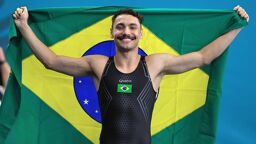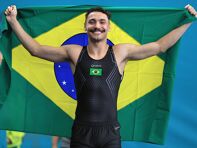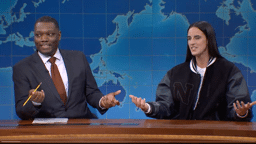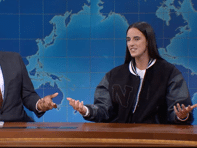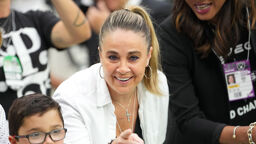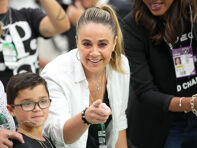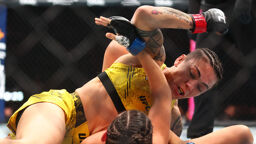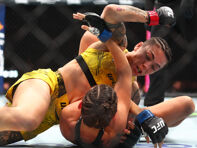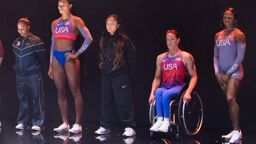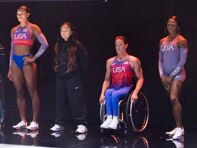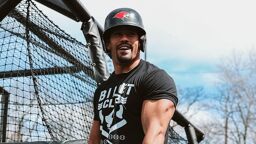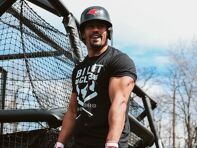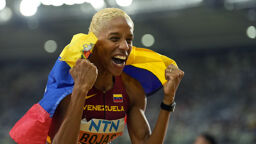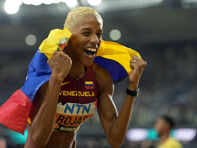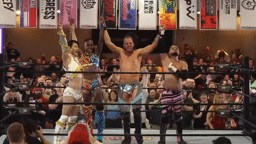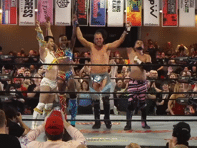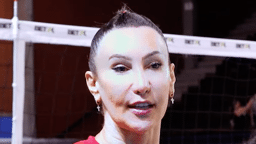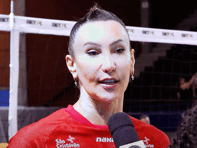It was on a recruiting trip to Limestone College in South Carolina that Alec Donovan finally answered "the question." Donovan had just won the New Jersey high school state championship in the 145-pound division of the NJSIAA/Rothman Institute Wrestling Championships. Along with him on the recruiting trip was another New Jersey wrestler who had placed in the state tournament.
"Rumor is you're bisexual," the other recruit said to him. "Is it true?"
It had been a long journey for Donovan, once fraught with fear, depression and suicidal thoughts since realizing he was gay as a high school freshman. Now a senior approaching graduation, he had climbed out of the abyss all the way to a state title and a peace of mind. There were a select few close to him who knew his secret, but he had never shared it with other top wrestlers.
"The rumor isn't true," Donovan told the other recruit. "I'm not bisexual… I'm gay."
The recruit was "cool with it" and found it fascinating. He asked Donovan if he could tell the guys on the Limestone team who were recruiting them. Donovan didn't care. He had accepted who he was. Fear had left him.
"It's better that everybody knows anyway, so I don't end up on a team that doesn't want me for all of me."
 Must Reads
Must Reads 
 Must Reads
Must Reads 
When the other wrestlers at Limestone College heard the news, they were hardly fazed.
"That's cool as long as you don't hit on me" was the worst reaction Donovan received from the Limestone grapplers.
"Why would I hit on you?" Donovan replied, happy to not face rejection. They laughed.
A state champion, Donovan was 39-1 in his senior season and ranked in the top 25 in the entire country for his weight class. The Limestone College wrestlers just wanted a good competitor to join their team. Donovan has stayed in touch with the captain of the team, and Limestone is one of Donovan's top choices for college. His sexual orientation is largely irrelevant to today's college athletes focused on excellence and victory.
Yet Donovan does not know where he will compete next year. At the time this story is published, Donovan is on a recruiting trip at Cal Poly in San Luis Obispo, halfway between Los Angeles and San Francisco. Other schools – in addition to Limestone College – have come calling as well.
For Donovan, the importance of being with a program that wants him for who he is – and the opportunity to help other LGBT athletes walking down the path he was on just three years ago – far outweighs any risk this story might pose.
* * *
During his freshman year at Brick Memorial High School, Donovan was plotting to kill himself.
Growing up in Brick, N.J., just over an hour outside of New York City and Philadelphia, he had heard anti-gay language in school, in sports and from friends and family all his life. Better to end that life than live it as a gay person, he had decided.
"I felt like I was a piece of dirt. I was worthless."
Worthless. This eventual state champion and top college recruit felt worthless three years ago simply because of his sexual orientation. Think about that. The environment in the United States – in and outside of sports – continues to drive talented, promising young men and women to suicidal thoughts, feeling as though the world is better served without them in it.
Donovan even wrote a suicide note. Thankfully it was the middle of wrestling season, and he felt an inexplicably loyal obligation to his team to finish the season with them. Despite early success, the season didn't end well. He missed weight at his regional meet by ounces and was barred from competition. His coach screamed at him. He was depressed, desperate for answers. He had let his coach down and he was… different.
He hit rock bottom.
In that time he researched suicide and the reactions to it. As he watched YouTube videos and read blogs chronicling the aftermath of suicide, Donovan became more and more present with his will to live.
At the end of his freshman wrestling season he reached out to a friend, Haley, for help. He was struggling with his sexual orientation and didn't know where to turn. Haley was the perfect sounding board. She convinced him to tear up the suicide note he had written to his parents – she stood and watched as he did it.
"I was so happy she made me do that. Because now I don't think about it. I'm moving forward."
* * *
During a road trip to Atlantic city his junior year, two teammates cornered him. On these road trips it was four guys to a hotel room. While one of his roommates was in the shower, the other two pressured Donovan into answered the last question he ever wanted to hear.
"I know we're brothers," said one of the teammates, "but are you gay?"
Donovan surveyed the hotel room carefully. He was nearer to the door than they were. He wanted to tell them the truth, but if they tried to attack him he needed an escape plan – that was the level of fear he faced. As he had been told all of his life, gay athletes would not be welcome on a sports team, let alone in a sport with athletes competing in the close quarters of wrestling. This could go very badly.
"Yes," Donovan told them, "I'm gay."
He braced himself for an attack that would never come.
"I'm proud of you," one of his teammates said. "We're brothers and, no matter what, brothers stick together."
The acceptance of those two teammates meant the world to him. He had for years feared how his peers would perceive him, whether they would reject him on the mat. Donovan (left, in the grey sweatshirt) had been channeling his will to live into wrestling. He wanted nothing more than to be the best wrestler he could possibly be – he wanted to be a state champion.
The acceptance of his teammates translated into renewed dedication to his sport. If he could accept himself, and if his teammates could accept him, then he could go as far as he chose to go.
* * *
Now a state champion, Donovan is a top college wrestling recruit. He has been ranked in the top 25 of high school wrestlers in his weight class in the nation. He lost one match out of 40 last season. And he's gay.
In the next 10 days he will decide for which college he will wrestle. With this public revelation, each school that has recruited him or offered him a scholarship has the opportunity to showcase inclusion. The next 10 days will be telling.
Whatever happens, Donovan knows he will be competing as a publicly out gay NCAA wrestler in the 2015-16 collegiate season. Unless someone else comes out in the sport in the next six months, he will be the first person to do so.
Yet his significance off the mat makes him just as enthusiastic. From the first time we communicated months ago, Donovan badly wanted to help other people by sharing his story publicly. The wins and the losses are great, and they lend heft to his story. Helping other people excites him.
Every time we have spoken, Donovan has mentioned a clandestine anti-bullying group he has been part of at Brick Memorial High School. Beating down his opponent in the ring is his trade, his lifelong passion. It has earned him college scholarships. It has brought him incredible glory in the form of a state championship. Yet tackling bullying and intimidation are what drive him more than success on the mat.
"I've done a lot of great things ever since I was suicidal," Donovan said. "But yeah, helping other people makes me most proud."
You can follow Alec on Twitter @thedoc42007. You can reach him via email at [email protected].
If you're a teen struggling with depression or thoughts of self-harm, please contact The Trevor Project immediately. Someone is there to help you.


